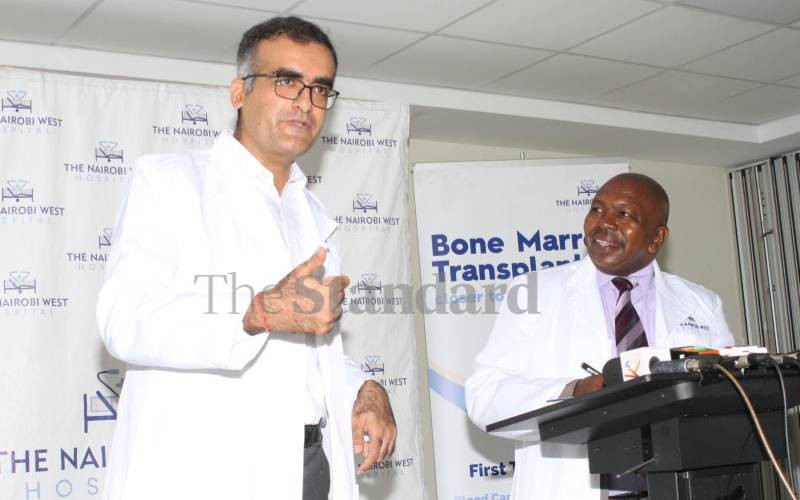
Patients with life-threatening conditions such as leukaemia, lymphomas, sickle cell disease, and immune deficiency disorders can now be treated with bone marrow transplants (BMT) in Kenya.
The Nairobi West Hospital has built the first-ever bone marrow transplant unit in the country, making Kenya a potential medical tourist destination in the region. The facility performed the first bone marrow transplant on October 10.
Margaret, a 55-year-old woman with Multiple Myeloma, successfully underwent a two-hour surgery at the hospital.
Dr Guarav Dixit, who headed the procedure, said Margaret is responding well to treatment and is on her way to full recovery.
They withheld Margaret's full name on the basis of medical confidentiality.
Speaking at the launch, Prof Andrew Gachii, the chief medical director at the hospital, said the move will transform access to quality, affordable specialised health care.
"Accessibility to advanced medical procedures like bone marrow transplants has been a major pain point for many Kenyans," he said.
- How doctors closed rare heart defect, giving Kenyan woman second chance
- How new Transplant law could improve access to kidney treatment, blood donation
- The hole no one saw: Inside life-saving heart surgery
Keep Reading
"An effective BMT unit backed by the world's leading specialists could make Kenya a medical tourism destination," he added.
The hospital has six BMT suits; five for adults and one for children.
The cost of a bone marrow transplant at the facility ranges between Sh2.7 million and Sh3.7 million. Going abroad for a similar treatment costs between Sh4 million and 10 million.
"We understand this is not cheap to the average Kenyan, but we've done all we could to lower the cost below what it costs to travel abroad for the same."
Dr Dixit said patients with blood cancer and autoimmune disease have a 75-80 per cent chance of recovery, and a 90 per cent recovery rate for children with sickle cell disease.
However, there is an age limit for the procedure.
"BMT is best performed on children, and not more than 65-year-old patients. Doctors will only consider selected patients over 65 years, depending on their overall physical well-being," said Dr Dixit.
Dr Dixit, head of the bone marrow unit, defined stem cells found in the bone marrow as the body's raw material. They can develop and regenerate any body organ, including blood, brain, bones, and hair. They are particularly abundant in the hip, sternum, and backbone.
"BMT is often considered a last resort, but it's a far more effective treatment when it's deployed early after diagnosis, while a patient is healthy and strong," said Dr Dixit.
Other diseases that can be treated through BMT include aplastic anaemia, some solid tumour cancers, multiple sclerosis and rheumatoid arthritis.
The process, Dr Dixit explained, involves removing or harvesting stem cells, sorting them, and infusing them back into the patient (autologous) or another person (allogeneic). The process is similar to blood transfusion.
The replanted cells then multiply and form fresh, healthy blood to power the body and build fresh immunity against disease.
Currently, the Nairobi West BMT unit can only perform autologous transplants. In essence, the patient is their own donor.
In a few instances, patients who have undergone autologous transplants will relapse.
But even then, Dr Dixit says, the patient leads a much better life than with chemotherapy and radiotherapy treatments.
The alternative, known as an allogeneic transplant, involves using stem cells from another donor whose tissue type matches the patient's.
The doctor said allogeneic transplants have lower chances of disease recurrence but carry a higher incidence of rejection by the patient's body. "Moreover, the donor cells can also decide to attack the recipient's body," he said.
Sandeep Dogra, the hospital's Chief Operating Officer, said the hospital intends to build a molecular lab that will allow proper processing, monitoring, and storage of donor cells to facilitate both types of transplants.
"Cells from other donors require molecular testing and extra harvesting and storage infrastructure, which we are looking to develop in the future," said Dr Kibet Shikuku, Chief Consulting Pathologist at the hospital.
During and after the procedure the patients are kept in isolation to prevent infection. For this reason, The Standard couldn't access Margaret's room.
"The patients are treated and placed in total sterility for recovery as they wait for the cells to engraft, after which they start to multiply and make new blood cells," said Dr Kibet.
 The Standard Group Plc is a multi-media organization with investments in media
platforms spanning newspaper print
operations, television, radio broadcasting, digital and online services. The
Standard Group is recognized as a
leading multi-media house in Kenya with a key influence in matters of national
and international interest.
The Standard Group Plc is a multi-media organization with investments in media
platforms spanning newspaper print
operations, television, radio broadcasting, digital and online services. The
Standard Group is recognized as a
leading multi-media house in Kenya with a key influence in matters of national
and international interest.











